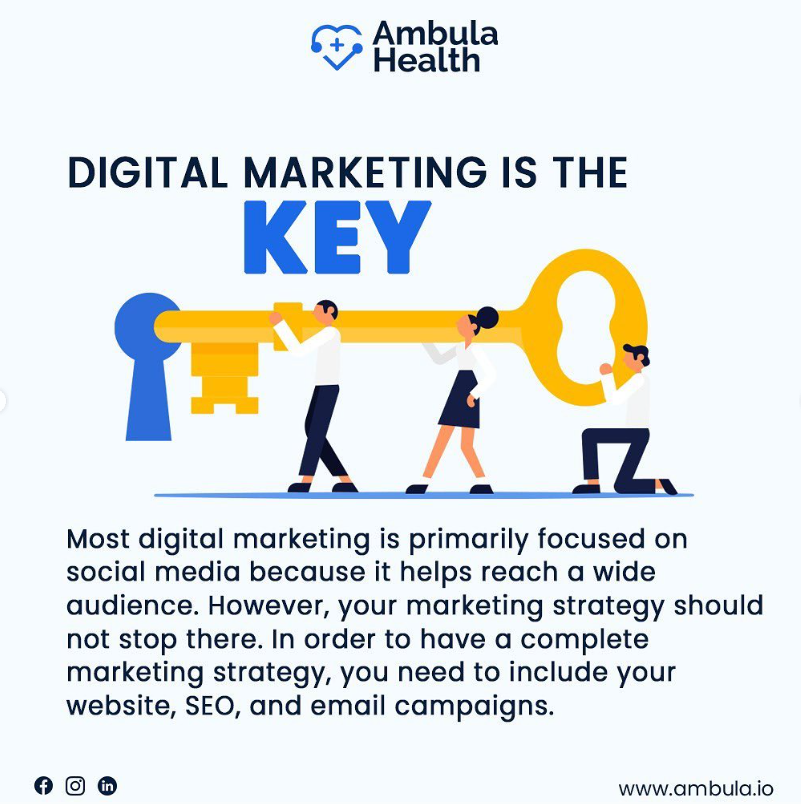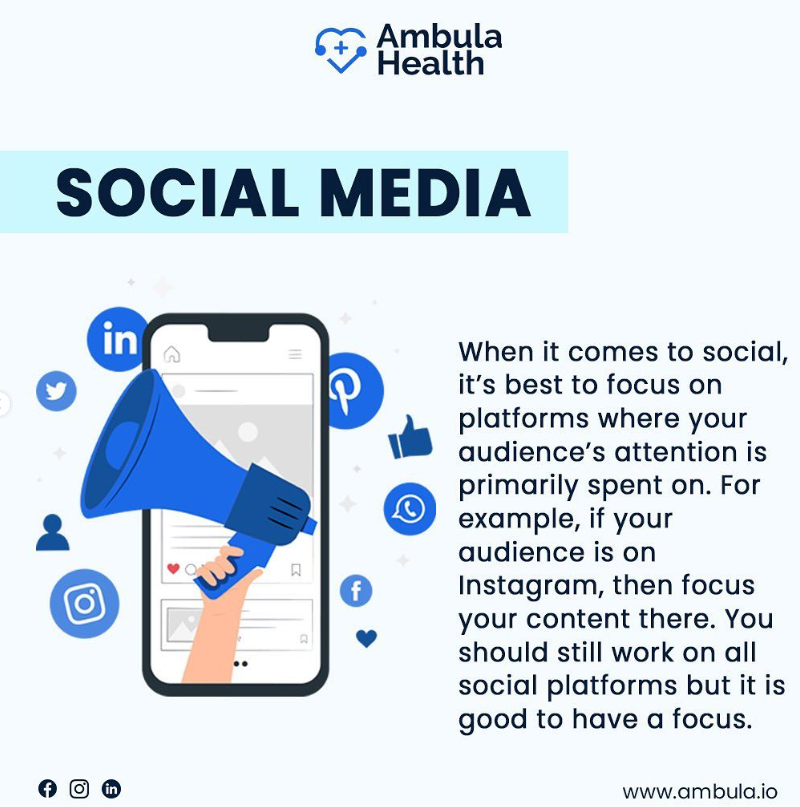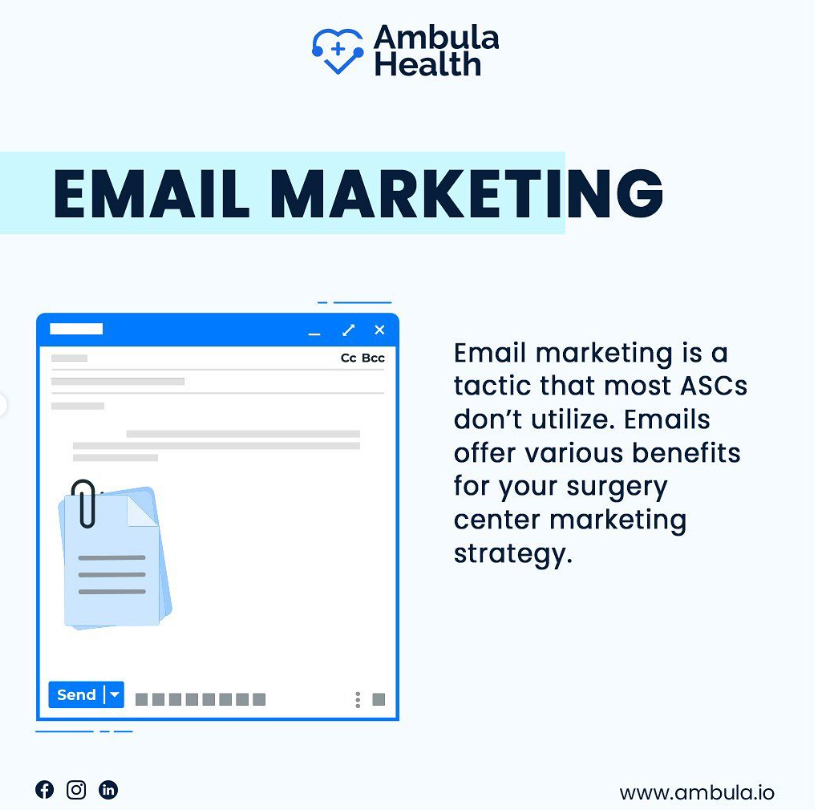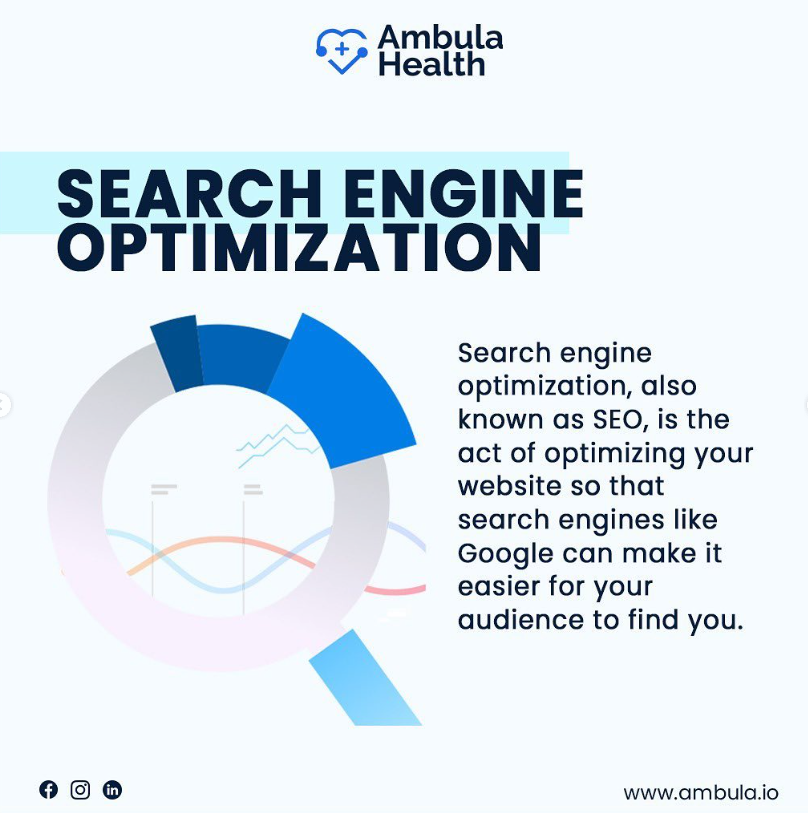Grow your practice & build trust with patients using these healthcare marketing strategies
Overview of Healthcare Marketing
A physician’s online presence is crucial in today’s digital age, and healthcare marketing can help you achieve your goals of growing your practice and building trust with your patients. In this article, we will explore the benefits of healthcare marketing and how you can use it to attract healthcare consumers and build confidence.
Why do you need healthcare marketing?
The benefits of healthcare marketing are valuable for growing your practice and building trust with your patients. Using the strategies outlined in this article, you can reach a larger audience, improve patient engagement, increase patient acquisition, and retain your existing patients.
Regularly assess and adjust your healthcare strategies to ensure you effectively reach your goals. Healthcare organizations and healthcare providers can leverage these digital healthcare marketing tactics to achieve their goals. What makes healthcare marketing important is that patients consider to switch healthcare providers if they don’t have an excellent online presence.
How does healthcare marketing grow your practice?
A healthcare organization and provider can grow their practice as follows:
Increased visibility and reach
Healthcare marketing can help you get a larger audience and increase your visibility online, making it easier for potential patients to find you. The healthcare community is thriving online, so don’t miss out.
Improved patient engagement
You can engage with your patients and build trust using various healthcare marketing strategies. This can help you establish a solid and loyal patient base.
Increased patient acquisition
By effectively marketing your practice, you can attract more patients, increasing your patient base and growth.
Improved patient retention
A solid online presence and effective strategies can help you retain your existing patients, reducing patient churn and enhancing patient satisfaction.
How does healthcare marketing build trust with patients?
Healthcare marketing can build trust with patients by providing valuable information, engaging with them, offering a positive patient experience, maintaining privacy and security, and showcasing positive patient experiences.
- Providing transparent and accurate information: By providing valuable information about your services and expertise through content marketing, as a healthcare professional, you can educate your patients and build trust in your knowledge and expertise.
- Engaging with patients online: Utilizing social media platforms to interact with them, respond to their questions and concerns, and provide updates about your practice can help build trust and establish a personal connection with your patients.
- Offering a positive patient experience: Implementing patient-centered marketing strategies, such as creating a user-friendly website or offering appointment scheduling through your website, can improve the patient experience and build trust in your practice.
- Maintaining privacy and security: Ensuring that your patients’ personal and medical information is kept private and secure through secure platforms and encryption technologies can build trust in your commitment to their privacy and security.
- Showcasing patient testimonials: Sharing positive patient experiences and testimonials on your website and social channels can help build trust and credibility with potential patients, showing that you have a track record of providing quality care.
Let’s start with a healthcare marketing strategy
Starting a healthcare marketing strategy involves defining your target audience, evaluating your current online presence, developing a content marketing plan, utilizing social, optimizing your website, implementing email marketing, and measuring and adjusting your efforts.
Any healthcare business must have a defined strategy to achieve its goals, and a provider’s practice is no different.
Define your target audience
Determine who your ideal patient is and what their needs and preferences are. This will inform your marketing decisions and ensure your strategies are tailored to your target audience. Understanding your ideal patient’s needs and preferences is crucial in developing a successful healthcare marketing strategy.
This information will help inform your marketing decisions and ensure your plans are tailored to your target audience. Consider age, gender, location, and health concerns when defining your target audience.
Evaluate your current online presence
Before you can start improving your online presence, it’s essential to understand what you’re working with. Look at your existing website, social media accounts, and reviews to determine what’s working well and what needs improvement.
This will give you a clear picture of your current online presence and help guide your future marketing efforts. Consider what changes must be made to improve your online presence and reach your target audience.
Develop a content marketing plan with healthcare consumers in mind
Decide what content you want to create and share with your patients, such as blog posts, videos, or infographics. Create a content calendar to plan and organize your content. Content marketing is a powerful tool for educating your patients and building trust in your expertise.
Decide what content you want to create and share, such as blog posts, videos, or infographics. Create a content calendar to plan and organize your content and ensure that your content provides value to your target audience.
Utilize social media of healthcare providers
Choose the social media platforms that are most relevant to your target audience and create a plan for how you will use these platforms to engage with your patients. Social media is a great way to engage with your patients and build a personal connection with them.
Choose the social media platforms that are most relevant to your target audience and plan how you will use them to reach and engage with them. Use social media to share your content, respond to patient questions and concerns, and provide updates about your practice.
Optimize your website
Your website is often the first point of contact between your practice and patients, so it must provide a positive first impression. Ensure your website is user-friendly, easy to navigate, and offers valuable information about your practice and services.
Implement search engine optimization (SEO) strategies to improve your website’s ranking and make it easier for patients to find you online. Prospective patients are using your website as a lead indicator of whether or not to trust healthcare practices
Implement email marketing
Develop a plan for using email marketing to keep your patients informed and engaged. Email marketing is a cost-effective way to keep your patients informed and engaged.
Develop a plan for how you will use email marketing, such as sending newsletters, appointment reminders, and special promotions. Ensure that your emails are personalized and relevant and provide value to your patients.
Many healthcare businesses think email is dead, but we can assure you it’s not. Include it in your strategic outreach and leverage the latest email marketing technology.
Measure and adjust
Health systems typically measure everything as they need to make data-driven decisions. Their marketing efforts are no different. Regularly measure the results of your healthcare marketing efforts and adjust your strategy as required.
Consider using analytics tools to track your website traffic, social media engagement, and email open rates, and use this information to make informed decisions about your marketing strategy.
Analyze healthcare consumer trends
Analyzing healthcare consumer trends is essential in building trust and engaging with patients. Here are some steps a healthcare organization or health systems can take to analyze healthcare consumer trends:
- Talk to your current patients: Conduct surveys, focus groups, or other types of market research to understand the needs and preferences of your patients. This information will help you stay current on healthcare consumers trends and ensure your healthcare marketing strategies are relevant to your target patients. Monitor online conversations:
- Use social listening tools to monitor online discussions about healthcare topics. Pay attention to what people say about your practice, competitors, and the healthcare industry. This information can help you understand current trends, identify opportunities to engage with your target audience, and help you understand their healthcare journey.
- Keep up with industry news: Read industry news and reports about current trends. Follow reputable healthcare publications and attend industry events to stay up-to-date on the latest developments in the healthcare industry. Follow other healthcare professionals that are in your industry or specialty.
- Engage with patients: Engage with your patients through online reviews, surveys, or in-person interactions. Ask for their feedback and listen to their concerns. This information can provide valuable insights into the needs and preferences of your target audience and help you stay in tune with current healthcare consumer trends.
- Collaborate with other healthcare providers: Healthcare consumers like to see their providers collaborate with other healthcare providers in their community. It can also help to share insights and stay informed about healthcare consumer trends.Consider forming a healthcare marketing group or attending local healthcare events to network with other providers and stay knowledgeable about current trends and healthcare services.
By conducting market research, monitoring online conversations, keeping up with industry news, engaging with patients, and collaborating with other healthcare providers, a physician can stay informed about current healthcare consumer trends and use this information to build trust and engage with patients and use this to their strategic advantage.
Track the success of your healthcare marketing strategy
Once you start implementing your healthcare marketing strategies, you may wonder, how do I know if this works? By regularly tracking these KPIs (key performance indicators), a physician can get a clear picture of the effectiveness of their marketing strategy and make informed decisions about how to improve it.
Website traffic
Track the number of visitors to your website and the pages they visit. Increased website traffic indicates that your efforts are attracting more patients to your website. Be sure you use your website to have consistent branding and attract patients.
Lead generation
Track the number of leads generated from your efforts, such as contact form submissions or phone calls. A steady increase in lead generation indicates that your marketing efforts effectively attract new patients to your practice.
Social media engagement
Track engagement metrics like likes, comments, and shares on social media platforms. Increased social media engagement indicates that your patients actively engage with your content and build a personal connection with your practice. Many medical practices don’t regularly update their social media, so don’t follow their example.
Email open and click-through rates
Track the open and click-through rates of your email marketing campaigns. High open and click-through rates indicate that your patients are interested in the content you are sending and taking action.
Patient satisfaction
Healthcare organizations and healthcare providers rely on patient satisfaction to build their reputations. It is essential to keep track of patients’ surveys and monitor reviews. Increased positive reviews and high patient satisfaction scores indicate that your efforts build trust with your patients and provide a positive patient experience.
Be sure to address any negative reviews so that a potential patient can have context about why this may have happened.
Return on investment (ROI)
Track the return on investment (ROI) of your efforts by comparing the costs of your marketing campaigns to the revenue they generate. A positive ROI indicates that your marketing efforts effectively drive revenue for your practice.
Let’s talk about healthcare SEO
Now that we understand healthcare marketing and how it can attract new healthcare consumers, let’s touch on SEO (Search engine optimization). This is one of the most significant ways for healthcare providers and healthcare organizations to acquire local patients.
This is often the most forgotten aspect of marketing that healthcare organizations miss. Most healthcare marketers attempt to focus on SEO as a way to get local patients. You can learn more about healthcare search engine optimization in our other blog.
How can healthcare organizations take advantage of Local SEO?
When it comes to finding a new provider, healthcare consumers start online. The first results the show up in their search results will be from the ones that focus on local SEO. Search engines want to provide people with providers in their area.
If your website or Google Business page does not take advantage of these digital marketing tactics, the search engines won’t show your business to future patients. If you’re working with healthcare marketers, ask them how to leverage local SEO.
Consider a budgeted healthcare marketing plan
Marketing budget management requires careful planning, regular monitoring, and effective decision-making. Here are some steps to help
Set clear goals
Define what you want to achieve with your efforts, such as increasing website traffic, generating new leads, or improving patient satisfaction. These goals will help guide your decisions about where to allocate your budget and what marketing activities to invest in.
Conduct a competitive analysis
Research your competition to understand their strategies and identify areas where you can differentiate yourself.
This will help you allocate your budget effectively and ensure that you are not duplicating efforts that your competitors are already doing.
Create a budget for your healthcare strategy
Based on your goals and research, create a budget for your efforts that includes all the activities you plan to invest in, such as website development, social media marketing, email marketing, and advertising.
Track and monitor your expenses
Regularly track and monitor your expenses to ensure that you stay within your budget and identify areas where you can make adjustments.
This will help you make informed decisions about which marketing activities are working and which are not and adjust your budget accordingly.
Evaluate and adjust your strategy
Regularly evaluate and adjust your strategy to ensure it aligns with your goals and uses your budget effectively.
This may involve changing your budget to allocate more resources to high-performing activities or shifting resources from lower-performing activities to meet your goals better.
Many healthcare providers can effectively manage their budgeted healthcare marketing plan and ensure their efforts deliver the desired results.
By continuously tracking and evaluating their actions, a healthcare provider can make informed decisions about allocating their budget best and growing their practice.
Let’s wrap up
In conclusion, growing a healthcare practice and building trust with patients is essential for success in the industry. By combining digital marketing strategies, patient engagement techniques, and transparent communication, doctors can attract new patients, retain current patients, and establish a strong reputation in the community.
Ultimately, taking a proactive approach to healthcare marketing can help doctors achieve their goals and provide their patients with the highest level of care.
How can Ambula Health help?
At Ambula Health, we understand the importance of a solid online presence in today’s digital world. We offer healthcare marketing services to help doctors grow their practice and reach new patients. We work with various healthcare businesses, healthcare facilities, and medical organizations. Our marketing department is a leader in providing marketing automation, reaching out to existing consumers and past patients.
We will create marketing materials through various marketing channels.
From website design and development to search engine optimization (SEO), our team of experts has the knowledge and skills to boost a doctor’s online visibility and help them stand out in a crowded marketplace.
With our customized marketing techniques, we work closely with each client to understand their unique needs and goals and develop a tailored strategy that helps them achieve their desired outcomes.
In brief, if you’re looking to increase patient engagement, paid advertising, paid social media, boosting, word of mouth referrals, drive more traffic to your website, or improve your search engine ranking, Ambula Health has the solution to help you reach your target audience and grow your practice.








